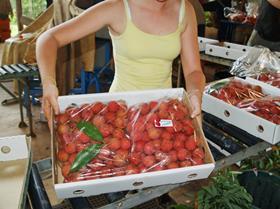
The US Animal and Plant Health Inspection Service (APHIS) has approved market access for irradiated Australian lychees to all mainland US states bar Florida, just four days after giving the green light to Australian mango exports.
All fruit will be checked at port of entry for the presence of the lychee hairy mite, which cannot be eliminated by irradiation, the report said.
APHIS' final decision came despite some US industry objections to imports being allowed into California, where there is emerging lychee production and the climate might suit the hairy mite.
However, APHIS said California’s dry Mediterranean climate was not conducive for the mite’s survival, and other weather issues made lychee production difficult in the state.
In the US, Florida has the largest lychee area under production (1,200 acres), followed by Hawaii (300 acres) and California (60 acres), according to APHIS. Currently, Australia produces 3,500 tonnes of lychees and expects to export around 400 tonnes per annum to the US.
Meanwhile, The Produce Marketing Association Australia New Zealand (PMA A-NZ) officially welcomed the decision by US authorities to amend regulations allowing the import of Australian mangoes into US.
PMA A-NZ CEO, Michael Worthington, said any regulation changes around export are positive for the Australian fresh produce industry.
“In terms of mangoes, Australia has a significant production volume coming on stream, potentially more than the domestic market can handle, so this development is very welcome for the longer term viability of the industry,” he said.
The amended regulations allow Australian mangoes to be imported into the US as long as they have undergone treatment against the fungus cytosphaera mangiferae, including a series of measures specified by APHIS, such as broad-spectrum fungicide treatment and irradiation to ward off the risk of mango seed weevil and fruit flies.
Australian mango shippers will have the option to irradiate the fruit at home or on US soil and APHIS expects Australia to ship roughly 1,200 tonnes of mangoes to the US annually.



